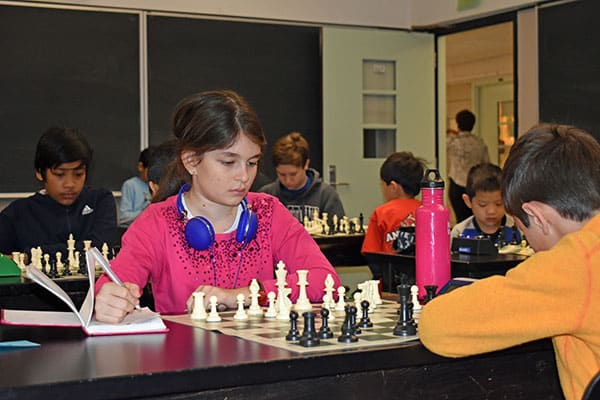The NSCF has been a pioneer in curricular instruction where chess is offered to students during the school day. Exposing all students to chess instruction, wherever possible, introduces and helps develop critical thinking skills at a young age.
Beginning in 1979, the NSCF’s Executive Director, Sunil Weeramantry developed a comprehensive chess program at Manhattan’s Hunter College Campus School, a leading laboratory school for talented and gifted students. This program evolved to the point where chess is now a required subject for all students in kindergarten through fourth grade. The Hunter administration believes that chess is an effective vehicle to develop critical thinking skills in younger students. To mark the program’s 40th anniversary, Sunil was recognized with proclamations from New York State Senator Elizabeth Krueger and New York State Governor Andrew Cuomo.

Another exciting collaboration has been with the Speyer School, a private school in Manhattan designed to meet the needs of advanced learners through an accelerated and enriched curriculum. The school founders invited Sunil to create the chess program. Speyer provides curricular chess instruction twice a week to all students, kindergarten through fourth grade. Students in grades 5 through 8 can participate in a chess elective. Sunil directed and taught the program for 10 years before recruiting a new chess program director to continue the legacy.
Sunil designed a pilot program for Greenwich Academy, an elite all-girls school in Greenwich, CT, which established chess as a curricular subject in grades 1-3. Sunil took on this challenge to encourage more girls to play chess. Over many years, the “GA Gators” enjoyed competitive success at a national level. In championing the chess program at GA, former Lower School Head Jeanette Tyndall noted that in situations where there are many possible right answers, even the brightest students may not be willing to respond for fear of being wrong. This can be mitigated by teaching chess, because in chess students learn there is regularly more than one correct answer. With chess at GA, the goal is to inspire excellence rather than perfection.
Having gotten chess into districts through talented and gifted programs, Sunil has been able to demonstrate that the benefits of a chess education can extend to all students. As one example, Greenburgh Central School District initially introduced chess in the gifted program, but soon expanded so that every K through 2nd grade student receives chess instruction.
Another example of reaching all students comes from New Rochelle. With support from the New Rochelle Fund for Educational Excellence, from 1995 through 2015, chess instructors from the NSCF taught a 24 week-program to every 2nd and 3rd grade class in five of the city’s elementary schools.
In 1984, Sunil worked with the school district in his hometown of White Plains, New York. Bonnie Ackerman, Talented & Gifted program coordinator, thought that the decision-making process in chess most closely aligned with the philosophy and logic track, rather than the more commonly accepted association with math. With a first-year grant from the American Chess Foundation and matching funds from the district, chess was offered in the gifted program curriculum in all elementary schools. The district continued to fund the program for the next 15 years.
The National Scholastic Chess Foundation is a 501(c)(3) non-profit educational organization. Donations are tax-deductible. Relevant IRS information is available on request.